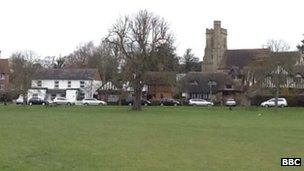Country dwellers in England pay 'rural penalty'
- Published

Country dwellers pay more in council tax but get less in return, the report suggests
Slow broadband and patchy mobile coverage in the countryside are proof of a growing urban-rural divide in access to services in England, MPs say.
A decent internet service was a "basic utility" but many rural households were not connected at all, the Commons Rural Affairs Committee said in a report.
Disparities in council and school funding exacerbated what MPs said was a "rural penalty" facing communities.
Ministers said the countryside should be a "great place to live and work".
Rural areas make up 86% of England while around a quarter of the population - some 12.7 million people - live in the countryside.
The government set up the Rural Communities Policy Unit in 2010 to ensure the unique challenges and needs of the countryside were taken into account but the cross-party committee said more must be done to ensure "fair and affordable" outcomes for inhabitants.
The countryside risks becoming the poor relation in terms of access to public services, the MPs warned, despite the fact that rural households paid more on average in council tax than their urban counterparts.
'Crucial'
While delivering services in remote areas cost more, the MPs point out that rural communities also receive less from the government - with school funding under half the level per head than for pupils in urban areas.
The MPs urged the government to act in five specific areas: broadband, mobile coverage; the cost of housing; allocation of school funding; and improving access to finance for rural enterprises.
On broadband, the committee said it was unclear when the goal of providing universal access to broadband at a minimum speed of two megabits per second would be achieved and ministers must set a firm date for doing this.
In 2011, ministers said 90% of premises in every local authority area of the UK should have access to internet speeds above 24 megabits per second by May 2015 but this target was recently revised to 95% coverage by 2017.
Anne McIntosh, the Conservative MP who chairs the committee, said £300m in funding set aside by the BBC in 2012 to support broadband roll-out should be used now to expedite superfast connections in the countryside.
"Broadband has become a basic utility yet thousands of people in rural communities have ridiculously slow speeds or no connection at all," she said.
"The Universal Service Commitment of 2Mbps is crucial and meeting it must be prioritised over increasing speeds for those who already enjoy an adequate service."
Almost 30% of households in England do not have access to a full choice of 2G mobile phone providers, with the figure rising to nearly 70% for 3G services, while plans to extend geographic coverage had been scaled back, the committee said.
'Great places'
With houses prices in rural areas, on average, 30% higher than in towns and cities, and yet rural incomes lower, the report concluded that parts of rural England were among the least affordable places to live.
"Rural England desperately needs more affordable housing yet the government's housing policies pay insufficient regard to the needs of rural communities," Miss McIntosh added.
"Failure to provide more of the right housing, at the right price and in the right place, will exacerbate the existing problems of unaffordability and inequality in parts of rural England."
In response, a spokeswoman for the Department for the Environment, Food and Rural Affairs said: "We want our rural communities to be great places to live and work, which is why we're investing in rural broadband, mobile coverage and providing funding to develop and grow rural businesses.
"The government is helping hard-working people all over the country who aspire to own a home through Help to Buy, which will help people get on to the housing ladder and boost housebuilding wherever there are housing shortages."
- Published5 July 2013
- Published30 March 2013
- Published19 June 2013